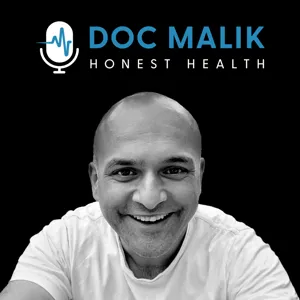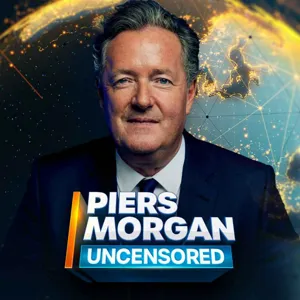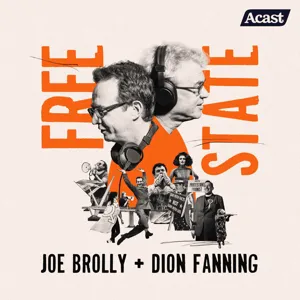Podcast Summary
Understanding complex global conflicts through personal connections and unbiased information: Educating ourselves about complex global conflicts like Palestine-Israel through personal connections and unbiased information deepens our understanding and allows for informed opinions and conversations.
It's important to educate ourselves about complex global conflicts, like the one between Palestine and Israel, even if they may initially seem distant or confusing. Information is power, and being knowledgeable allows us to form informed opinions and engage in meaningful conversations. Personal connections can also deepen our understanding and investment in these issues. For instance, the speaker's family background, with a Palestinian grandmother and a sister living in Palestine, gave her a unique perspective. To gain a well-rounded understanding, it's essential to seek out unbiased historical information from various sources and consider both sides of the conflict.
Understanding the complexities of the Israel-Palestine conflict: Both sides have suffered, but acknowledging power dynamics and historical context is crucial for a deeper understanding of the Israel-Palestine conflict. Listening to firsthand accounts and engaging in conversations with those directly affected can provide valuable insights and empathy.
The narrative often presented about the conflict between Israel and Palestine, which positions Palestine as the aggressor, is oversimplified and misleading. The historical event known as the Nakba, or "the great catastrophe," in which over 700,000 Palestinians were displaced in 1948, is a prime example of this. Palestinians were forced to flee their homes due to violence and intimidation from Israeli forces. My guest, Nana, whose family is from Yaffa, a beautiful area now known as Tel Aviv, shared her family's story of being caught in the crossfire during this time. It's crucial to acknowledge that both sides have suffered, but the power dynamics and historical context are essential to understanding the complexities of this ongoing conflict. Nana's unique perspective as a bridge between being a Black American and a Palestinian woman offers valuable insights into the similarities between the conflicts faced in America and Palestine. By listening to firsthand accounts and engaging in conversations with people directly affected by these issues, we can gain a deeper understanding and empathy for the complexities of these conflicts.
Palestinians left homes temporarily during Nakba but were denied entry back: During the Nakba in 1948, Palestinians were forced to leave their homes temporarily due to violence, but upon trying to return, they were denied entry, leaving them without their homes and possessions and creating a deep sense of loss and displacement that has been passed down through generations.
During the events leading up to the Nakba in 1948, Palestinians were advised to leave their homes temporarily due to escalating violence. However, upon trying to return, they were denied entry. This mass exodus left Palestinians without their homes and possessions, creating a deep sense of loss and displacement that has been passed down through generations. The Israeli population, armed and supported by the British military, held the advantage in this conflict, making it difficult for Palestinians to defend themselves. The inability to bear arms and the lack of protection contributed to the sense of ambush and onslaught felt by Palestinians during this time. To this day, the keys to their former homes and Palestinian passports remain cherished family heirlooms, symbolizing the longing and hope for a return to their ancestral lands.
Experiences of a Palestinian family in refugee camps: Acknowledging historical facts and recognizing the importance of allowing all groups to live freely is essential. Refugees face challenges such as confinement to camps and lack of opportunities, but they can still persevere and maintain relationships.
The discussion highlights the experiences of a family who were displaced during the 1948 Nakba and had to flee their homeland in Palestine. They ended up in refugee camps in Egypt and later in Lebanon. The family members shared stories of their struggles and how they managed to survive. It's important to note that this conversation does not aim to attack anyone's religion or right to live. Instead, it emphasizes the importance of acknowledging historical facts and recognizing that if one group has the right to live freely, then the same should apply to others. The family's story also sheds light on the challenges faced by refugees, such as being confined to camps and the lack of opportunities to work and support themselves. Despite these hardships, the family members found ways to persevere and maintain their relationships, ultimately leading to a loving marriage between two refugees.
A young marriage defying societal norms: Love and family traditions transcended societal pressures, allowing a young couple to marry and build a life together despite disapproval, ultimately discovering a larger community and enduring through loss and change.
Love and family traditions transcended cultural norms and societal pressures in the story of my grandmother's young marriage. Despite the disapproval of neighbors and friends, my grandmother chose to marry young, trusting her father's wishes and her own feelings. My grandfather, who loved and cared for her deeply, supported their union by allowing them to live with him until she was older. This unconventional arrangement allowed the family to eventually relocate to Kuwait, where they discovered a larger community of their relatives. However, when my grandmother returned to her childhood home in Palestine decades later, she was struck by the stark reality that her family's history and community had been erased, with their houses destroyed and replaced by a park. The loss of familiar smells, like that of orange blossoms, added to the heartbreak of this realization. Ultimately, the story illustrates the enduring power of love, family, and tradition, even in the face of adversity and change.
Erasure of Identities: Palestinians, Native Americans, and Aborigines: Historical oppression, forced assimilation, and ethnic cleansing impacted various communities globally. Addressing these issues requires recognizing their interconnected roots in colonialism, systemic racism, and ethnic cleansing.
Colonization and systemic racism have led to the erasure of identities for numerous communities around the world, including Palestinians, Native Americans, and Aborigines in Australia. These groups have faced oppression, forced assimilation, and ethnic cleansing. The parallels between these historical events are significant, and it's essential to recognize and address the root causes of these issues. The same systemic racism, colonialism, and ethnic cleansing that have affected Black communities in America also impact Palestinians. Ignoring one issue while addressing another does not create lasting change. Learning from history, such as the studies done in South Africa, shows that these issues were not developed in isolation but were influenced by each other. Therefore, supporting the freedom of Palestinians is not only necessary but interconnected with the fight for racial justice and equality.
Israeli-Palestinian conflict: Not a simple 50-50 dispute: The Israeli-Palestinian conflict is rooted in historical oppression and occupation, with Palestine lacking a government and military. Annexation of land and tactics of divide and conquer further complicate the issue, and Hamas is a response to this oppression.
The Israeli-Palestinian conflict is not a simple 50-50 dispute between two equal parties. Instead, it's a complex issue rooted in historical oppression and occupation, with Palestine lacking a government and military. Annexing of land, such as what Israel has done in Palestine, is a major contributor to this conflict. Hamas, while labeled a terrorist group, is a response to this oppression and should not be the sole focus of discussions. The misperception that the conflict is a simple "clash of equals" ignores the systemic issues at play and hinders productive dialogue. Additionally, the historical tactics of divide and conquer, as seen in the separation of Palestinian communities and their unique food cultures, further exacerbate the conflict.
Misconceptions about the Palestine-Israel conflict: The conflict is not equal, funding goes to Israel's military, and it's not a religious war for Palestinians. Educate yourself and advocate for change.
The so-called "Palestine-Israel conflict" is not a conflict between equal sides, but rather an occupation. This misconception is fueled by the media and the belief that the situation is too complicated for individuals to understand. However, with the help of resources and research, anyone can grasp the basics of the issue. Another common misconception is that as Americans, we have no stake in the matter since the U.S. supports Israel with our tax dollars. This funding primarily goes towards Israel's military, and if individuals want to make their stance clear, they can speak up and demand their tax dollars be allocated differently. Lastly, it's essential to recognize that this is not a religious war for Palestinians and their ancestors. These misconceptions perpetuate a lack of understanding and action, allowing the oppressive situation to continue. It's crucial to educate ourselves and advocate for change.
Life in Palestine before the Conflict: Before the conflict, Palestinians and Jews lived peacefully together. Today, Palestinians in Gaza lack basic necessities and seek equal rights and true democracy.
Before the Nakba, or the creation of Israel in 1948, Palestine was home to people of various religions living peacefully together. The speaker's grandmother shared personal experiences of Jewish neighbors in Palestine before the conflict. The speaker emphasizes that the conflict is not about religion but humanitarian issues, such as lack of basic necessities like food and water for Palestinians in Gaza. The speaker encourages researching the daily life of Palestinians in Gaza to understand their struggles. The speaker asserts that Palestinians want equal rights and true democracy, not occupation or secondary citizenship. The speaker expresses concern about the fear that has allowed the conflict to continue and the distortion of religion as a tool to prevent discussions on the issue. The speaker calls for acknowledgment of the harm caused to both sides and adherence to basic tenets of major religions, such as treating others as you would like to be treated.
Lessons from history echo in Palestine: Historical parallels reveal ongoing injustices in Palestine, with social media amplifying Palestinian voices and experiences
The current situation in Palestine resonates deeply with historical instances of colonization, ethnic cleansing, and oppression that have been taught in an academic context. The speaker, who grew up receiving an American education, expresses a sense of personal connection to these lessons and feels compelled to speak out against injustice. They note the similarities between historical events, such as the Holocaust and apartheid, and the present situation in Palestine, which involves control over resources, ethnic profiling, and the erasure of culture. The use of social media allows Palestinians to share their experiences directly, revealing the ongoing nature of these issues and challenging the historical distance that many people feel towards them.
Personal experiences shaping understanding of history: Empathy towards different communities and their struggles can be deepened through personal connections to their history. Recognizing the complexity of historical narratives and the experiences of all involved parties is crucial for fostering positive change.
Personal experiences and connections to history can shape our understanding and empathy towards different communities and their struggles. The speaker shares how their early education about the Holocaust, guided by a compassionate teacher, deepened their connection to the Jewish people and their history. This sense of empathy and shared history has influenced their perspective on the Israeli-Palestinian conflict. The speaker also acknowledges the complexity of historical narratives and the importance of recognizing the experiences of all involved parties. The power of social media in shaping public discourse is highlighted, but its potential for misinformation and algorithmic manipulation is noted as a concern. Ultimately, the speaker emphasizes the importance of understanding that real people are living through these issues as they unfold, and encourages earnest efforts towards positive change.
Promoting peace through neutrality and education: Neutrality and education are key to promoting peace in the Middle East by acknowledging Palestinian existence, removing financial support, and fostering balanced discourse.
Normalizing the conversation around Palestine and taking a neutral stance by removing financial support is crucial for promoting peace and understanding. The speaker shares her personal experiences of feeling silenced and unacknowledged due to the lack of public acknowledgement of Palestinian existence. She urges everyone to educate themselves about the complex situation and its roots, as misinformation can perpetuate conflict. By taking a neutral stance and removing financial support, individuals can make a difference and contribute to a more balanced and informed discourse. The speaker emphasizes that this is not an anti-Israeli stance but a call for acknowledgement and equality for both Palestinians and Israelis.
Exploring Different Cultures and Perspectives: Seek out resources to learn about diverse cultures, listen to and respect perspectives, and value family connections. Embrace open-mindedness, empathy, and the pursuit of knowledge.
Exploring and learning about different cultures and perspectives is essential for understanding the world around us. Neda shared her experiences as a Palestinian woman and encouraged listeners to seek out resources such as books, podcasts, and Instagram accounts to gain more insight. She emphasized the importance of listening to and respecting the perspectives of those who have lived through historical and ongoing struggles. Neda also emphasized the importance of family and lineage, encouraging listeners to value and appreciate their connections to one another. Overall, the conversation highlighted the importance of open-mindedness, empathy, and the pursuit of knowledge.
Funding political oppression in Palestine through tax dollars: Educate yourself and take action against political oppression in Palestine by contacting senators, regardless of personal engagement in the conversation.
Continuing to fund political oppression in Palestine through our tax dollars goes against human rights and traditions, and it's important for individuals to educate themselves and take action, such as contacting their senators to demand change, even if they choose not to engage in the conversation directly. This issue is not about attacking Jewish people or Judaism, but rather addressing political oppression. The speaker emphasizes the need for black communities to stand up for their rights without mirroring their oppressors and encourages listeners to approach the issue with an open mind and heart. The conversation is part of the Starbain's Odd Lab podcast, and listeners can save money on brunch ingredients and beverages by using the Kroger app.






